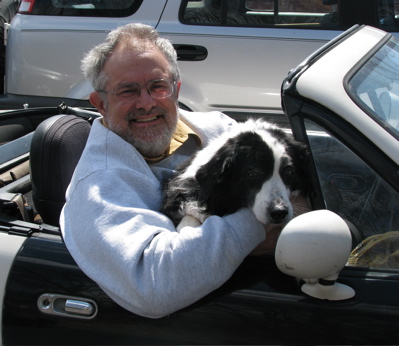
Guest contributor: Mike Land
Captain America Agrees
categories: Cocktail Hour / Movies
Comments Off on Captain America Agrees

Mike Land
The night before I interviewed the peace activists, I headed to the theater to see Captain America: The Winter Soldier. I figured this brand of mindless violence would be just what I needed to unwind after another day of interviewing and planning for my three-month cross country research project about the role community service plays in people’s lives. Enough of lofty thoughts and earnest contemplations, of hearing about hospices and the homeless – I wanted to watch Cap America and Commander Fury take care of business in a morally unambiguous universe, laying waste to a bunch of simplified bad guys in the most special-effect-laden way possible.
Then I could get back to reviewing the questions I was going to ask of Claire and Scott Shaeffer Duffy, who for decades has walked the walk of the Catholic Workers – a collection of 227 spiritual communities that are, as the website puts it, “committed to nonviolence, voluntary poverty, prayer, and hospitality for the homeless, exiled, hungry, and foresaken.”
Someone who, even if their way of life allowed her to blow $12.50 at a movie theater, probably wouldn’t choose that particular movie.
But if you think the two paragraphs above are my confessional, just wait – I’m just getting started. For I didn’t witness a violence-laden action flick only to realize the error of my way once I sat down with peace activists the next afternoon. Instead, I saw the movie that night precisely because I was meeting peace activists the next afternoon. The truth is, I was imagining the above opening even as I was entering the theater. About the time Captain America had felled his 20th bad guy – code for the 20th minute – I was, in the back of my mind, composing the three paragraphs you just read.
Regardless of their politics, every memoirist undertaking a project about their present – or near-future – has lived, and written, through such moments. I don’t even know why I feel uneasy about it. The rationale is sound enough: Since the quality of writing about a life is limited by the way that life unfolds, why wouldn’t we want to rig said life in a way that maximizes our chances of delivering the readers what they deserve – a good story? It’s not that we’re trying to fool anyone: I would hope for readers smart enough to, in turn, deem me smart enough to have thought of such things. After all, I’m doing this for them.
Time for another confession.
In this case, I would’ve seen the movie anyway. I’m not pretending that seeing Captain America was a sacrifice I made for my art. (Now, when I had to write a review of Turner and Hooch, on the other hand …) But the timing was not exactly a coincidence, either. The truth is that whenever you enter an experience you know you’re going to write about, inevitably there is a temptation toward falsity and contrivance. Even in the case of Turner and Hooch, knowing I was going to write a review automatically distanced me from what was happening on the screen. Now this knowledge may make me a keener observer and a more curious participant – but it still changes that experience.
As I plan my trip, one challenge is how to allow the elbow room for truth, to be true to what actually happens, rather than what the storyteller in me wants to happen. To be relentlessly honest in what I do find, not what I hope to find in service of a good story. To connect with what’s happening and forget, in the moment, that I might write about the moment I’m living.
This would seem to suggest there are some experiences in life you don’t want to ruin by writing about at all. Experiences too profound or too painful – or simply meaningful in some mysterious way that seems beyond language altogether. This is true enough: There are topics I’ll never touch. But in most cases I argue that writing actually aligns your life with greater truths. For without the writing project, it wasn’t Captain America I would’ve missed – it was the peace activist.
But my conversation with the peace activist is a story for another day. When the time is right, I’ll strive to tell that story as honestly as I can – and trust the reader to recognize that, occasional contrivance aside, I’m doing the best I can to explore some greater truth. And since I’m drafting this before I’ve even met my interviewee, I don’t know what that truth will be.
And that, too, is as it should be.
Seeing as how he’s pledged to honesty, even Captain America would agree.
 When Mike Land was 18, a computer spat out the results of a standardized career test that claimed he’d be either a writer, a teacher, or a pastor. He swore contemptuously that no standardized test could “measure the depths of the human soul” and stuck the dot-matrix printout t in a notebook that wound up in his mother’s attic. By the time he saw those results again, he had worked as a church youth director and a newspaper journalist, earned two creative writing degrees, and wound up both writing and teaching writing while running a community service learning program at a religiously affiliated college (Assumption College in Worcester, Mass.). All of which leaves him wondering if, despite his Unitarianism, maybe his soul isn’t really all that complex a read. He is currently circulating a manuscript about a dog-themed road trip.
When Mike Land was 18, a computer spat out the results of a standardized career test that claimed he’d be either a writer, a teacher, or a pastor. He swore contemptuously that no standardized test could “measure the depths of the human soul” and stuck the dot-matrix printout t in a notebook that wound up in his mother’s attic. By the time he saw those results again, he had worked as a church youth director and a newspaper journalist, earned two creative writing degrees, and wound up both writing and teaching writing while running a community service learning program at a religiously affiliated college (Assumption College in Worcester, Mass.). All of which leaves him wondering if, despite his Unitarianism, maybe his soul isn’t really all that complex a read. He is currently circulating a manuscript about a dog-themed road trip.
